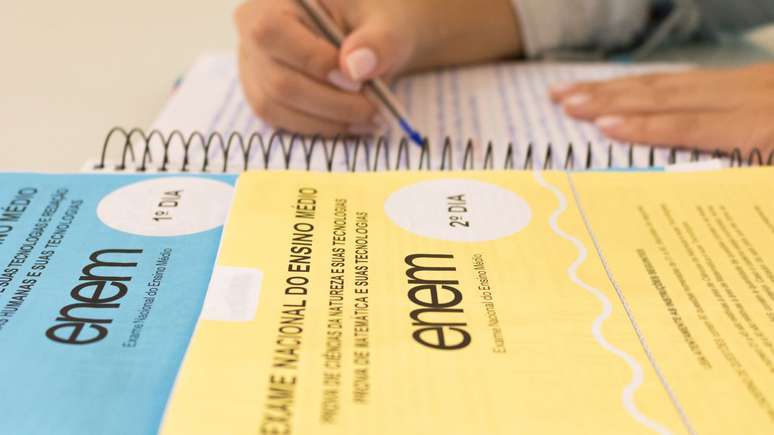Many young people are nervous and don’t even know what to do in the days leading up to the long-awaited Enem test; know how to act with them at this time
That much talked about and even feared moment is approaching, especially during high school: the Enem test. From November 5 to 12, more than one million students from all over Brazil will take the test and answer 180 objective questions, in addition to the essay. However, in the days before the exam, many parents have a question: how to help their children at this time?
After all, many young people are nervous or have difficulty in the weeks leading up to Enem. And it is precisely here that parents can be of great help, guiding their children and also helping them with their studies, as appropriate.
According to Cesar Guimarães, professor, mathematician, physicist and teacher of the USP, not all parents will know the subjects to help them directly with their study, because they may no longer remember some of them. If so, they can help, for example, by asking questions about the topics.
But what everyone can try to do is help organize their children’s studies, helping them to create a Study program. This program can be modified if other specific commitments arise, because free time is also important, but we must try not to distort it too much.
Maria Beatriz Neri Flores, psychologist at Newton Paiva, suggests another type of help linked to the environment. “It is important that parents offer an adequate study environment to their children and respect their study times, so that they can concentrate and achieve better results”, says she, who works at the NAPp – Pedagogical Support Centre.
For both professionals, another important issue is the psychological side of the student in this final stretch for Enem, and parents also play an important role in this.
The problem of excessive pressure: what to avoid?
When young people feel a lot of pressure regarding the Enem or other entrance exams, this can be harmful. This excessive pressure can come from the student himself, from teachers in society at large, or, often, from parents (even if this is not the intention).
“It is very common that parents, in an attempt to help, demand more from their children than they can bear, entrusting them with the responsibility of realizing the dream they have idealized. This external request generates an exaggerated self-demand in this student, who he may present episodes of anxiety when he thinks he may not be able to meet the expectations placed on him,” says Maria.
In other words, it is necessary to avoid this excessive demand and encourage children at this time. “Always reiterate that they have been preparing all year for this test, that they have the necessary knowledge to be able to answer the questions and, above all, that they are supported regardless of the result. It is also up to parents to talk to their children about how they are doing, about sensations in view of the arrival of the test and, if necessary, also ask for help from professionals who can help them”, explains the psychologist.
Furthermore, Maria points out that another parental attitude that can harm students without them realizing it is comparing them to other people. According to her, it will be of no use to keep saying that her cousin studied more, or that her neighbor got better grades in the simulations. Because every person has a different rhythm.
Cesar explains that the other extreme, complete lack of pressure, is also not good. “(Letting the child manage himself completely) is also harmful. If he is not already used to planning his day, this student will not be able to cope without any requests in the right balance,” says the CEO of MMP Materials Pedagógicos.
The ideal strategy before Enem
An aspect that also causes anxiety in the final stretch of Enem is the question: what to do in these last days? Is it better to intensify your studies in this final stretch or use this time to relax? You can also try to guide your children in this direction if they need it.
According to professionals, the strategy in this regard will vary from student to student. “For some it is necessary to have a more relaxed moment before the test, after a year of intense studies. For others, the tension does not allow this rest, so they prefer to continue studying”, explains Maria.
What is certain is that, even for those who want to study, it makes no sense to try to review the entire content or insert lots of new information. Then, encourage your kids to focus on revision in this final stretch.
“One solution could be to observe which contents have been most requested in recent years in each area of knowledge. Then, it is possible to draw up a list of priorities, giving priority to the revision of the contents that are most difficult,” says the psychologist.
Furthermore, professionals emphasize the importance of rest and relaxation even in the days before the test. “It is also important to prioritize sleep, healthy eating and hydration, to arrive at the test day with the necessary energy”, explains the specialist. He also emphasizes the need for students to spend these days with those who love them and help them feel more relaxed and confident.
Finally, on the day of the test there are also some recommendations that will help. “The student must be well for this test. In other words, he must be rested. And it is very important to have a good, light meal, so as not to have a stomach ache during the test”, comments Cesar.
Source: Terra
Ben Stock is a lifestyle journalist and author at Gossipify. He writes about topics such as health, wellness, travel, food and home decor. He provides practical advice and inspiration to improve well-being, keeps readers up to date with latest lifestyle news and trends, known for his engaging writing style, in-depth analysis and unique perspectives.








